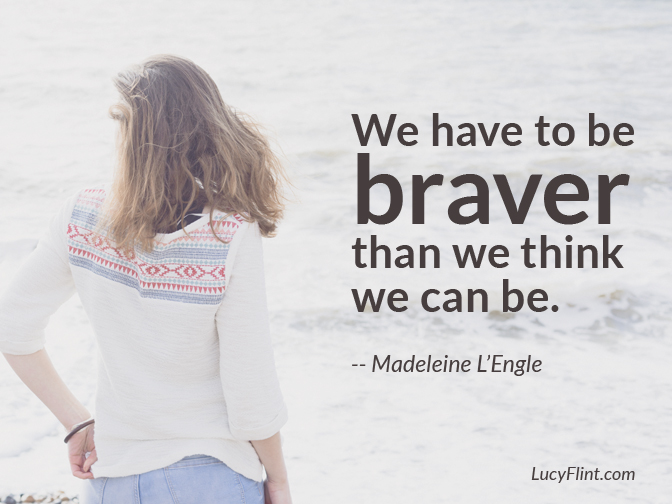This Is How You and I Are Gonna Remake the World
/It takes an incredible amount of focus, energy, and determination to fling your brain into a fictitious universe.
I mean... think about it. We are creating a different reality and then trying to jump into it.
That takes some work. Right? A ton of focus, courage, boldness, willingness, and all the imagination power you can muster.
Also? It's Monday.
So let's get a pep talk from a bunch of other creatives, other world-jumpers.
Below are thirty of my favorite quotes for the writing journey. Quotes for this mysterious, shadowy, reality-jumping side of the writing life.
Think of it as a big shot of caffeine for all of us who are chasing our stories.
Woo hoo!
One of the few things I know about writing is this: Spend it all, shoot it, play it, lose it, all, right away, every time. -- Annie Dillard
Don't be so afraid of giving yourself away, either, for if you write, you must. And if you can't face that, better not write. -- Katherine Anne Porter
To write truly good stories, stories that will satisfy you as well as your readers, you must do something no writing teacher, no book, no guidelines, can help you with. You must take risks. Knowing your craft can help you tell a story. But only by taking risks can you make art. -- Marion Dane Bauer
Good writing comes from writers on the edge. -- Ralph Keyes
You have to write your own book. The one only you can write. No one else. This takes fearlessness, but the exciting good news is doing the book teaches you the fearlessness you need. -- Heather Sellers
You have it inside you to fight this fight. Write, think about what you write, then write some more. -- James Scott Bell
Always attempt the impossible to improve your work. -- Bette Davis, note to self
Sometimes the mind needs to come at things sideways. -- Jeff VanderMeer
Write. Write badly, write beautifully, write at night. Stay up way too late, ruin your skin, forget to shave, grow your hair long at your age, and write and write and write and write. Make a mess. Don't clean it up. Do it your way. ... This is your book. -- Heather Sellers
I believe that solitude, perhaps more than anything, breeds creativity, breeds originality. -- Elizabeth Berg
I am learning to see loneliness as a seed that, when planted deep enough, can grow into writing that goes back out into the world. -- Kathleen Norris
You find yourself writing your way out of loneliness, writing your own company. -- Barbara Abercrombie
The uncharted path is the only road to something new. -- Scott Belsky
Words are, of course, the most powerful drug used by mankind. -- Rudyard Kipling
I get ready every night. I pack for the trip. I load my dream mind, hoping I will wake in the morning inspired, clear, and refreshed. I read good books. I have my journal by my bed. Every night, I'm getting ready for my writing morning. I point myself that way. -- Heather Sellers
The primary purpose of imagery is not to entertain but to awaken in the reader his or her own sense of wonder. -- Tom Robbins
I don't know anything when I start. The only thing I know is that I'm starting. -- Richard Bausch
Writing a novel is like driving a car at night. You can see only as far as your headlights, but you can make the whole trip that way. -- E.L. Doctorow
Faith is taking the first step even when you don't see the whole staircase. -- Dr. Martin Luther King Jr.
Writers steer by wonder and desire. -- Heather Sellers
All writing is dreaming. -- Jorge Luis Borges
The impulse for much writing is homesickness. You are trying to get back home. -- Joan Didion
Embrace passion as a daily practice. -- Donald Maass
You must have a belief in your vision and voice that is nothing short of fierce. -- Betsy Lerner
Be Careless, Reckless! Be a Lion! Be a Pirate! When You Write. -- Brenda Ueland
There is so much about the process of writing that is mysterious to me, but this one thing I've found to be true: writing begets writing. -- Dorianne Laux
Yes! Yes! THAT!
... And here's the last one, which is a long, granddaddy of a quote, but here we go anyway because it's lovely:
If you want to write, if you want to create, you must be the most sublime fool that God ever turned out and sent rambling.
You must write every single day of your life.
... I wish for you a wrestling match with your Creative Muse that will last a lifetime.
I wish craziness and foolishness and madness upon you.
May you live with hysteria, and out of it make fine stories. ...
Which finally means, may you be in love every day for the next 20,000 days. And out of that love, remake a world. -- Ray Bradbury
There it is, my lovelies. The best kind of sustenance for this journey we're on.
Your turn: Any favorite quotes that help you be a reality-jumper? a dweller in a fictitious time and place?
Which of the above quotes will you be using to dive into your alternate reality this week?
Happy dreaming, my friends! Happy writing, lionhearts.


















